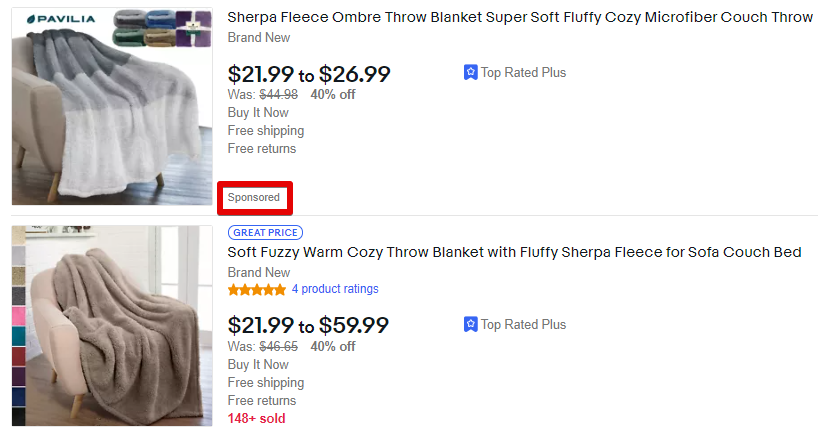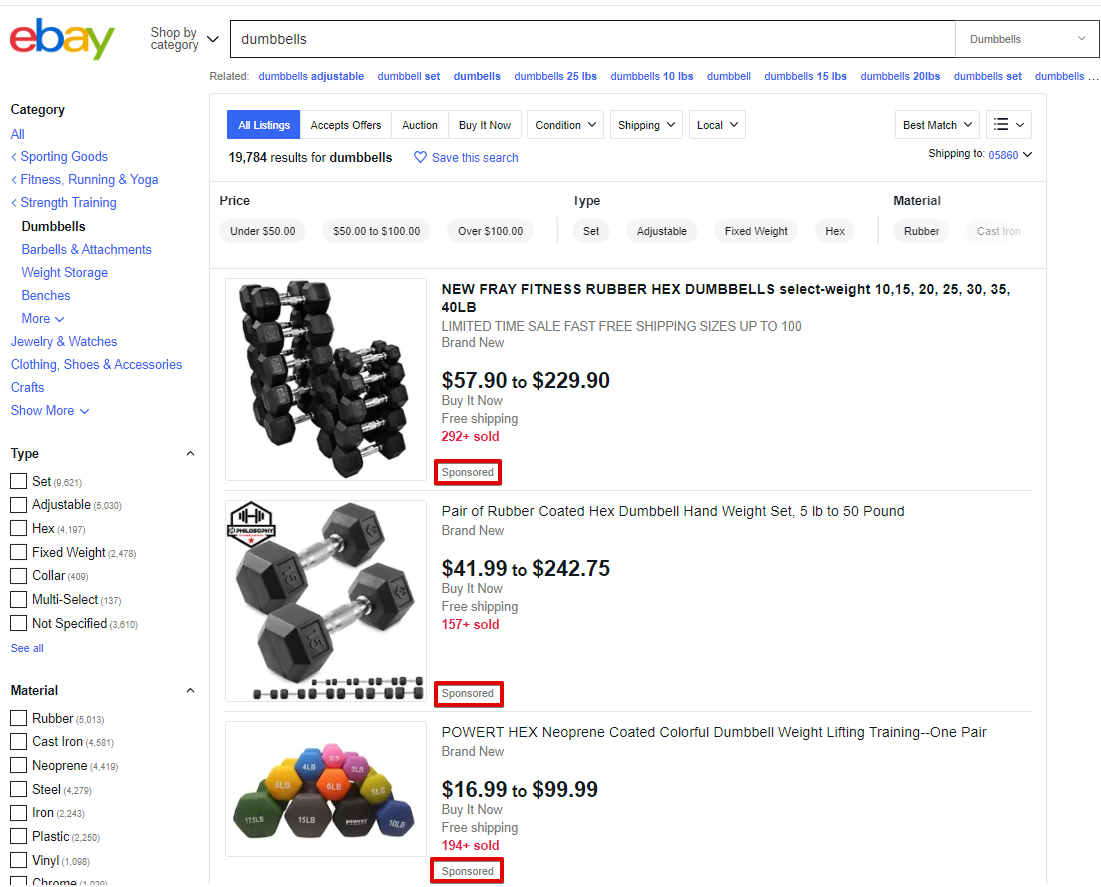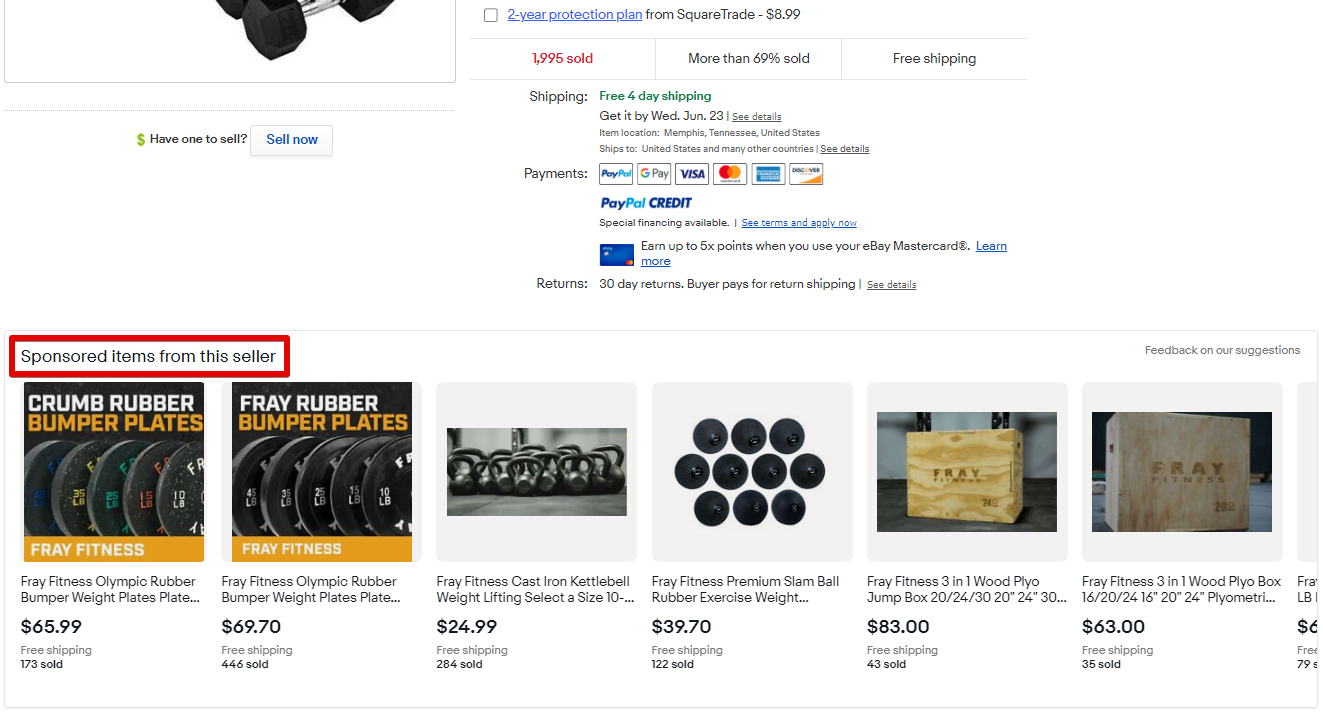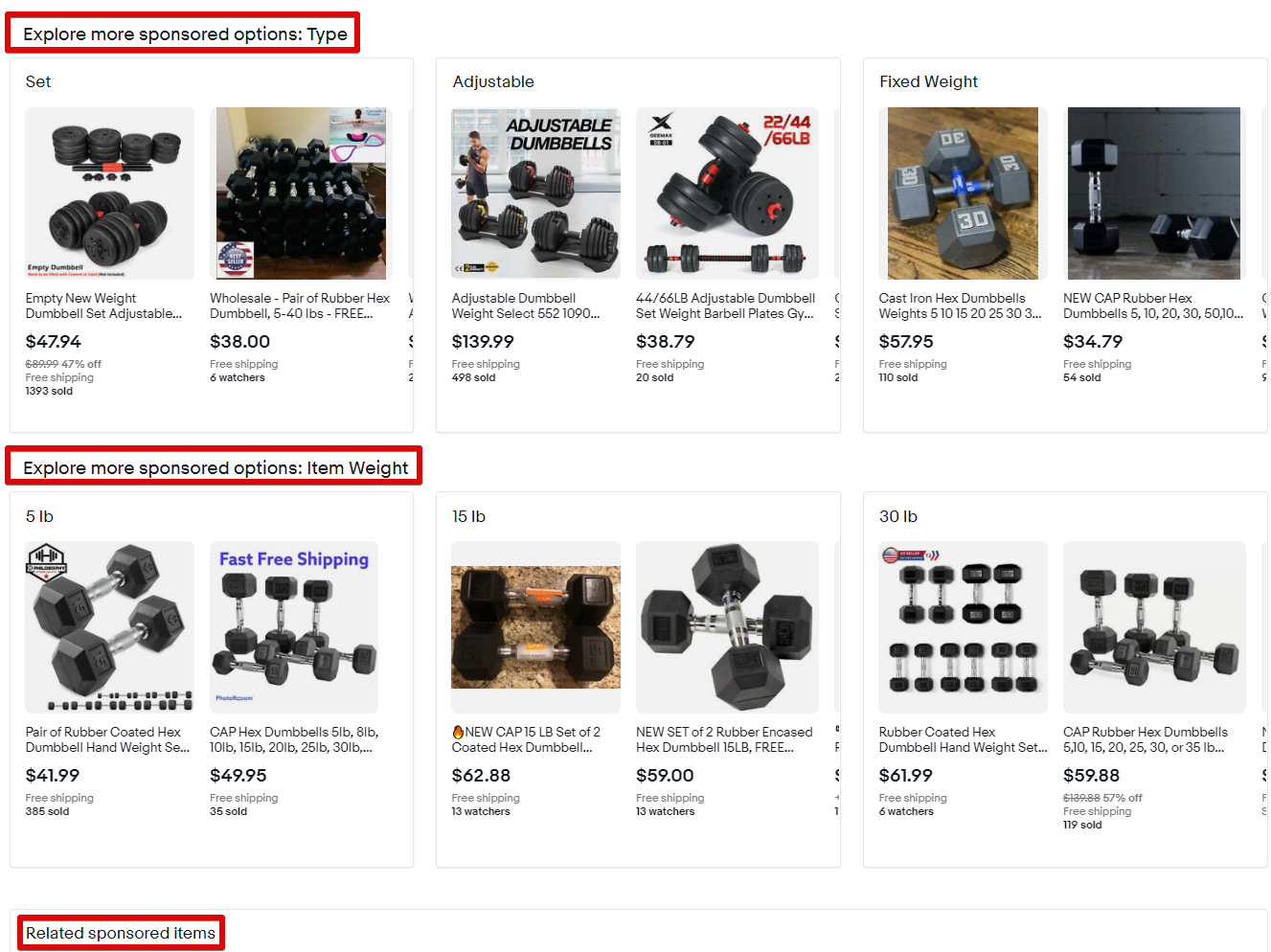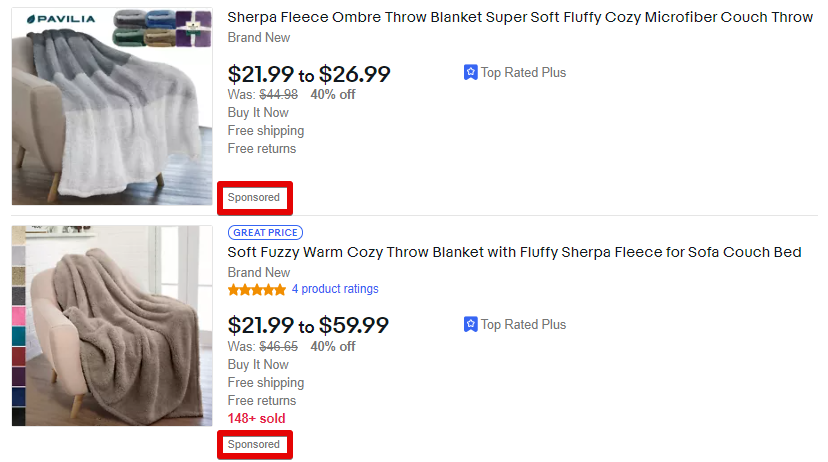Should you use eBay’s promoted listings? The answer is incredibly simple: yes!
Well, probably, at least.

Not always.
OK, so it’s not that simple.
While many kinds of ads can waste your money, these are well worth the cost in most situations. But if you don’t understand them, you could do more harm than good for your profits. Here’s how they work and when to use them.
Last updated 6/17/2021.
What Are Promoted Listings on eBay?
They’re the listings that appear as “Sponsored” all over eBay.
In a standard search, they basically work like any other listing. They look about the same. If you change your listing, the change will appear in your ad as well. The only real difference is the word "Sponsored."
What makes them worth paying for is the search ranking. The normal rules of eBay SEO still apply, but promoted listings rank higher than normal listings. You're essentially bribing eBay to put you above the competition.

You say it isn't worth your soul. But what if I added... 2%?
Say you're trying to sell dumbbells and your listing normally ranks #3 in searches for "dumbbells." You decide to promote the listing. The next time someone searches for "dumbbells," eBay will consider how much you're willing to pay before putting you back in spot #3.
If you offer to pay enough, they'll rank you in spot #2 or even #1. But, if the people who rank above you are willing to pay too (or if their listings are just way better than yours), then eBay won't give you those higher rankings. They'll just show your normal listing in its normal spot.
The good thing about this: you don't have to pay any advertising fees when your listing appears in its normal spot. Your listing is only treated as a promoted listing if it gets ranked higher than normal. (Just see the catch later in this article.)
Note that eBay will only show the promoted listing or the normal listing in a single search. They will not show both at the same time.
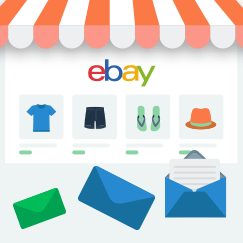
Do They Appear in Places Other Than Search?
Promotions also make up the overwhelming majority of recommended items on product pages.
Hey man, I heard you like weights, so...
eBay also states that they can appear to shoppers on search engines and on eBay partner websites.
Why Should I Use Them?
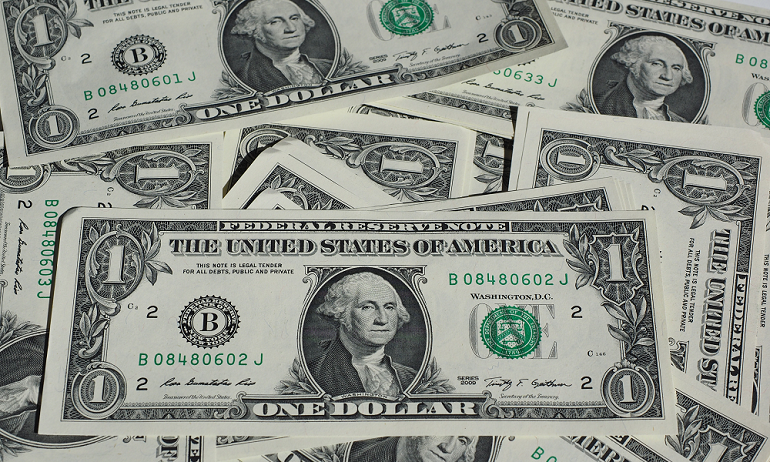
Because you’re only charged for the ad if you make a sale through it.
That almost makes Promoted Listings a no-brainer. If your listings don't rank higher and make sales, you won’t be charged a dime. And if it does work, you’ll almost certainly have made sales you wouldn’t have otherwise.
eBay claims that promoted listings see up to a 36% boost in views. That means a lot of extra sales, and you only pay the fees on sales the ad brought in. Sales you won in searches where you ranked normally are not charged the advertising fee. (But see the catch.)
In short, you get:
- Better search rankings.
- Your listings in ads on and off eBay (with a little luck).
- More sales than normal.
- A chance to bury your competitors.
- No extra fees on the sales you make organically.
That's a pretty good deal!
Which Listings Can You Promote?
Only fixed-price listings. So, sadly, no using this to get a ton of bidders on your auctions. Some categories don't qualify either, including Real Estate, Vehicles, and Everything Else.
You’ll only see the allowed listings when you start setting up your promotions.
How Much Do They Cost?
You decide how much you’re willing to pay. You set the amount as a percentage of the item price (the fees don’t apply to any separate shipping charges or taxes), which can be as low as 1%. This is called the “ad rate.”
When a buyer runs a search that your item would appear in, eBay decides if it wants to promote your listing. The higher your ad rate, the more likely your listing will rank higher than normal. You can see the trending rates here.
How Do Ads Get Ranked? And When Does Your Organic Listing Appear Instead?

Ad rate isn’t everything! If your listing is more relevant to the buyer’s search, you might get chosen over a competitor with a higher ad rate. The same thing can happen if your listing sells better.
eBay wants their money. Their system is built to maximize both the chances of the shopper buying something and how much they'll make from the fees they charge the seller. Our educated guess is that their algorithm works something like this:
- Sellers A, B, C and D sell orange widgets and use Promoted Listings.
- A buyer searches for “big orange widgets.” Seller D sells small orange widgets, so eBay decides they're the least relevant and would organically rank #4 for this search.
- Since no ad rate can justify a higher rank for seller D, eBay shows Seller D's organic listing instead of their promoted listing.
- eBay sees that seller A's listing sells three times more than any other and decides they would organically rank #1. Seller B sells the second most and would rank #2, while seller C sells only a little less than seller B and would rank #3.
- Now, eBay considers the ad rates. Seller C has an ad rate of 10%, while sellers A and B only bid 5%.
- Getting double the fees from seller C's bid makes eBay decide it's worth ranking them above seller B. Seller C's listing becomes a promoted listing in rank #2, while seller B's is demoted to rank #3 and displays organically.
- Seller A still sells three times more than seller C, so eBay decides they'll make more money by keeping seller A in rank #1 to maximize sales. Seller A keeps their #1 spot with their organic listing.
What just happened?

Math just happened!
All four sellers bid on promoting these listings. But in the end, only seller C's appeared as a promoted listing in search results, because their bid was enough to promote them from rank #3 to rank #2. Seller B also lost their second-place spot because they bid too low. The other two sellers appeared in their normal spots with organic listings.
That may sound complicated, but it's hugely oversimplified. eBay takes a ton of factors into account. And the average results page has a lot more than four sellers!
Some key takeaways:
- You can get away with bidding low if your listing sells well and has good eBay SEO.
- The opposite is also true. Bidding high on Promoted Listings won’t make up for having a bad or irrelevant listing. Make sure you use high-quality product photos and write a powerful description.
- You can lose your hard-earned organic and promoted ranking to someone who outbids you. Combine good optimization with a good ad rate to rank as highly as possible.
When Are Promoted Listings Not Worth It?
When they ruin your margins.
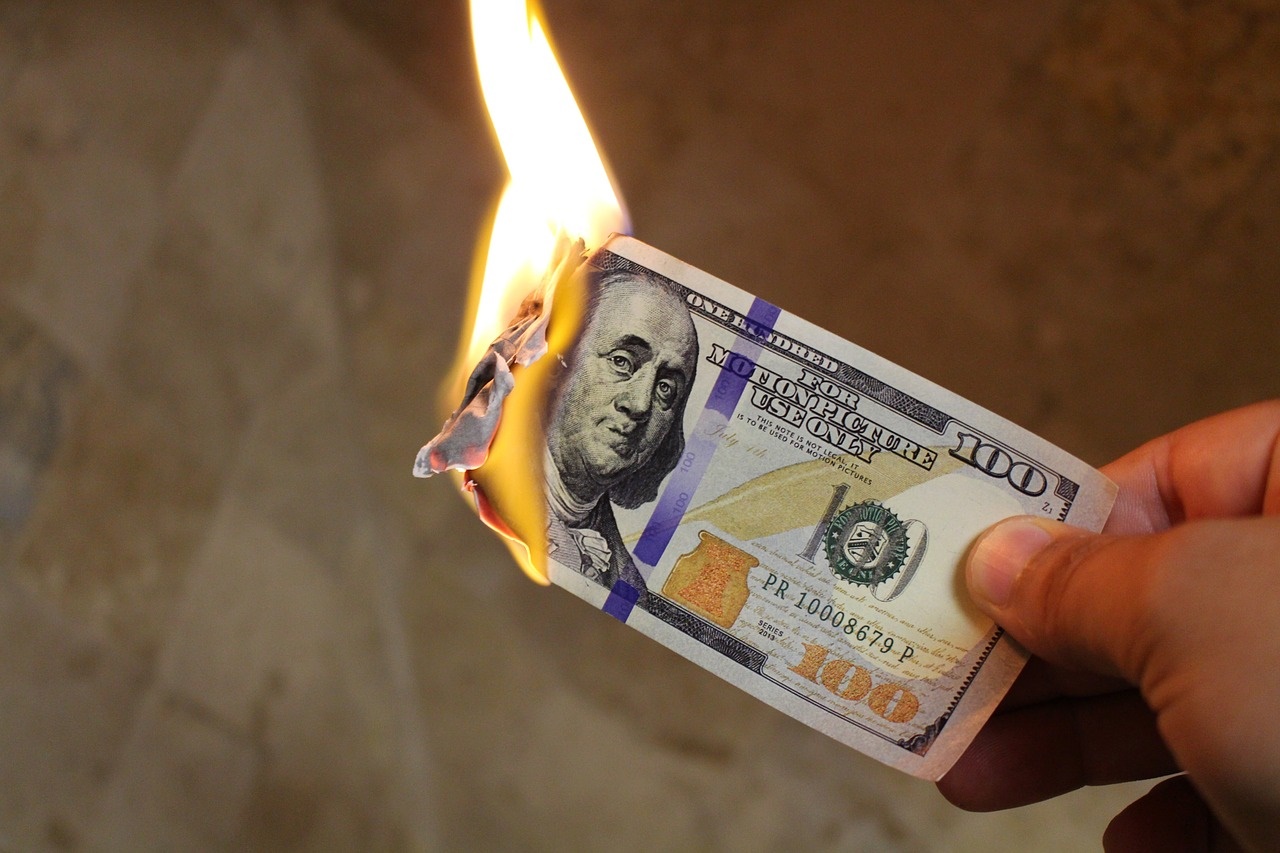
Using these ads can wreak havoc on your profits. Most ad rates trend around 5–8% in the US. If you’re already running on razor-thin margins of 5% or less, you probably won’t be able to afford them.
When you combine this with the standard cost of selling on eBay, you can easily lose over 20% of your sale price to fees. Ad fees, payment processing, and normal eBay fees all add up. Not all of us can afford that stack of charges.
Sure, you could raise your price to cover the added cost. Or you could switch from offering free shipping to charging shipping fees separately. (Remember, ad rates are not charged on your shipping fees.)
But of course, taking either of these actions could deter customers. And if eBay sees your listing making fewer sales, they'll rank it lower—both when promoted and in organic results.
Promoting your listings can also be a bad idea if your ranking improvement doesn't justify the cost. Moving from rank #10 to #1 is huge, and even from #3 to #2 is big. But moving from rank #15 to #14 barely changes a thing, so if that's all you're getting, you're better off investing in eBay SEO.
Is It Ever a Good Idea to Use Them Even If You Lose Money?

Occasionally, yes. For example, if you need to sink a competitor or improve an item’s sales history, it can be a good strategy. Besides, the losses will only occur on the sales made through the promotion. You’ll still make a profit on the people who only click on the organic version of your listing.
Take a good look at the effect on your margins. If the squeeze would be so bad that the increase in sales wouldn’t be worth it, don’t use Promoted Listings.
What's the Catch?

If someone clicks on one of your ads and doesn’t buy, eBay records that they clicked the ad. If they come back to your listing and buy the item within the next 30 days, even if they click the organic listing or use a bookmark, you have to pay the ad rate.
The rate you pay is whatever you had in place at the time of the buyer’s first click in that 30-day period. So, even if you lower your ad rate or end your promotion, you may still have to pay your old rate on some sales for weeks to come.
Although you may be charged on the old rate, it will be calculated on the price at the time of sale. If you’ve reduced your price, that’s a good thing. But it could be bad if you jack the price up after ending your promotion!
How Can I Start Using Them?

If you’re eligible, you can start promoting listings in one of two places: a specially made dashboard, or the Active Listings page in Seller Hub.
You can also use Promoted Listings Lite in the quick listing tool, but this forces you to use the recommended ad rate. That doesn't leave much room for strategy and experimentation.
Note that you may not see these options if you don't qualify.
In general, any seller in good standing with recent sales qualifies to use Promoted Listings. The US and UK eBay sites state that any Above Standard or Top Rated Seller who's made sales recently can use the program. Canada and Australia say it's open to any seller "in good standing with an established sales history."
Promoted Listings is available on eBay US, Canada, UK, Germany, Australia, France, Italy, and Spain. If you're selling on another eBay site, you may not be able to use it.
Will These Ads Guarantee More Sales?
Definitely not. The odds are good that your sales will go up, but success still depends on the quality of your listing. Here are a few ways to improve your chances of a successful promotion:
- Make sure you know how to take photos for eBay.
- Keep your feedback score high.
- Set a compelling price.
If you can do that (and afford a competitive ad rate), you’ll do well with eBay’s Promoted Listings. Give them a try and see how they work for you!




